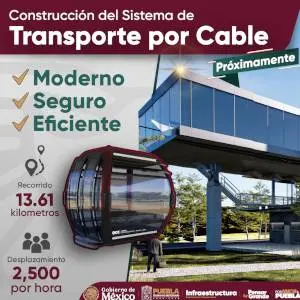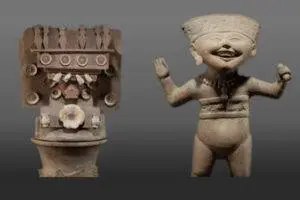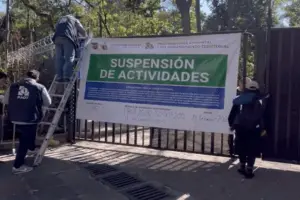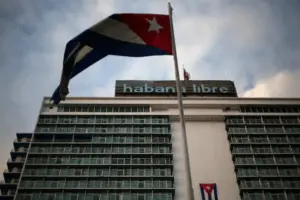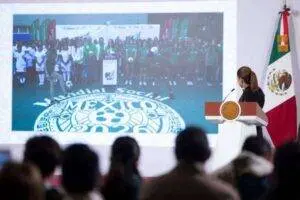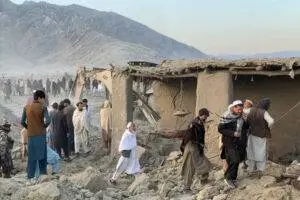My friends,
Fellow Mexicans:
A historic date such as the beginning of the Mexican Revolution cannot go unnoticed. On a day like today, an honest man, Francisco I. Madero, with libertarian ideals, called on the people of Mexico to take up arms to overthrow the Porfirista dictatorship.
In the manifesto, dated November 20, 1910, there is a paragraph that clarifies the reason behind this movement for transformation. It reads: «Mexico is governed by a tyranny that has sought to justify itself based on the benefits of peace and material prosperity. But this peace does not rest on law, but on force, and this prosperity only benefits a minority, not the people or the Nation.»
Indeed, the Porfiriato is synonymous with slavery, oppression, and oligarchy. The government was never on the side of the communities but rather was with the landowners. It did not protect the workers but rather the bosses, and obviously there was never justice or democracy.
The Maderista revolution was truly effective. In only six months, from November 20, 1910, when the people were called upon to take up arms, in only six months, the overthrow of Porfirio Diaz was consummated. There was a loss of human lives, «14,000 died on the battleground of the revolution,» according to Luis Cabrera’s estimate in September 1912. But this toll, always regrettable, would turn out to be less than that recorded in the subsequent stages of much greater violence. In addition, relatively little money was employed in the Maderista revolution. From the first days after its victory, the revolution was rigorously audited like no other revolution in the world. It cost 642,195 pesos, of which 358,000 were earmarked for the purchase of arms, ammunition, and equipment. The total amount was acknowledged by the interim government which, respecting the agreement of May 31, 1911, handed it over to Gustavo A. Madero, who proceeded to return it to the contributors. Freedom had been won without much ado. The damages to productive activities were minimal; the life and interests of foreigners were respected; there was no capital flight and the public Treasury was not weakened. One month after Francisco I. Madero’s entry into Mexico City, it was reported that «the cash audit practiced in the General Treasury shows 63,070,000.00 pesos, with extraordinary expenses already covered.»
However, the arduous work to dismantle the old regime and meet the demands for democracy and justice had yet to begin. From his triumphal entry into Mexico City on June 1, 1911, until his cowardly assassination in the early morning of February 23, 1913, the leader of the revolution and president of Mexico, Francisco I. Madero, suffered an agonizing ordeal. The apostle of our democracy was perhaps, has been perhaps, the most attacked and betrayed political figure for doing good in all our history, to the extent that José Vasconcelos went so far as to say that Mexico did not deserve Madero.
But his sacrifice and that of a million Mexicans was not in vain. Thanks to the Revolution that erupted with greater strength and depth after his assassination, the 1917 Constitution was approved, which was undoubtedly the most advanced in the world in terms of social justice. It established the right of peasants to land, the eight-hour workday, the minimum wage, other important labor benefits, public education, the nation’s control of public goods and natural resources, as well as recovering the oil wealth that was in the hands of foreigners.
That is why this date is historic and foundational in several senses. Among other achievements of the Revolution, the creation of the Armed Forces stands out. It should not be forgotten that the current Army was born at the call of Governor Venustiano Carranza to repudiate and fight Victoriano Huerta, after the coup d’état against President Madero; and that the popular origin that both the Ministry of Defense and the Ministry of the Navy have always maintained, makes them different from other military corporations in the world, the latter characterized more by their elitism and for being alien to popular causes. That is why we should be surprised that now in this new peaceful, but profound and humanist revolution that we are carrying out among all of us and from below, it should not surprise us that the Armed Forces are helping us so much, so very much.
General Luis Cresencio Sandoval González explained what the Army has contributed in favor of our people, many work projects, many actions throughout the country for the benefit of the Mexican people. This has also been done by the Ministry of the Navy. Therefore, it is a mark of pride to commemorate one more anniversary of the Revolution of 1910, demonstrating with deeds, as a great revolutionary, General Francisco J. Mújica, used to say: «deeds, not words». It is very satisfying to be able to tell the Mexican people that they have the democratic government, the Army, the Navy, and the National Guard their side as their guardian angel so that our people can live in peace and well-being.
My friends:
I want to inform you that we chose today, as General Sandoval mentioned, and as we all know, the Revolution was made by railroad and on horseback, and this announcement has much to do with our Revolution, it would take me time to argue it, but this day was chosen to publish the decree that today appears in the Official Gazette. This decree establishes the return of modern passenger train service with the use of 17,484 kilometers of railroad tracks and facilities that were concessioned for freight service, and now these railroad tracks will also be used for passenger train service. This includes, in a first stage, the operation of the following routes: Mexico City – Veracruz – Coatzacoalcos; Felipe Angeles – Pachuca Airport; Mexico City – Queretaro – Leon – Aguascalientes; Manzanillo – Colima – Guadalajara – Irapuato; Mexico City – San Luis Potosi – Monterrey – Nuevo Laredo; Mexico City – Queretaro – Guadalajara – Tepic – Mazatlan and Nogales, as well as Aguascalientes – Chihuahua – Ciudad Juarez, also considering the stations that were in operation before 1995, when passenger service was suspended.
We made this decision because train travel will be more economical, comfortable and less polluting, since the tracks can be electrified. It is safer public transportation and will increase the mobility of the population from Mexico’s main cities to the northern border.
Long live the Mexican Revolution!
Long live Mexico!
Long live Mexico!
Long live Mexico!
Zócalo square, Mexico City, November 20, 2023


